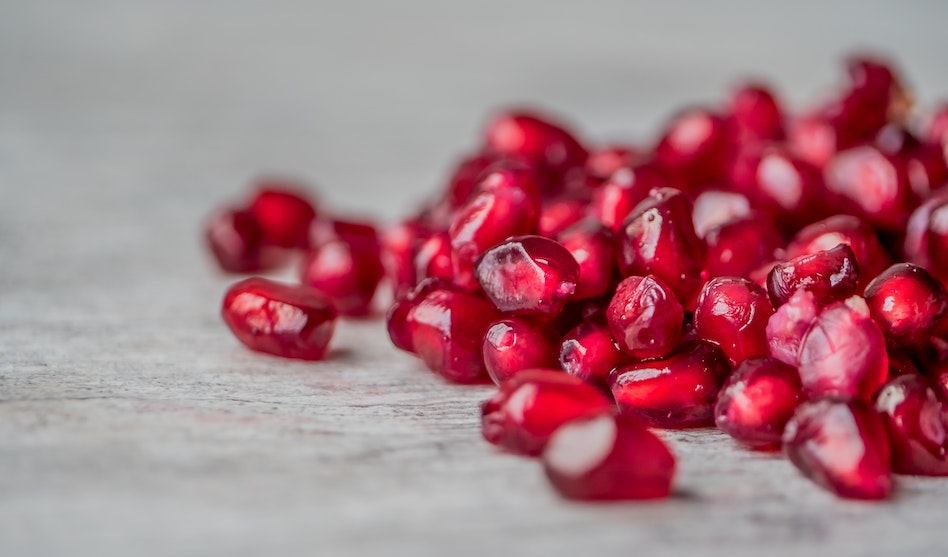
Benefits of Eating Pomegranate Daily

6 Benefits of Eating Pomegranate Daily: Nutritional Value of Pomegranate-2023)
Pomegranates are spherical, red fruits. They have a white interior body that is closely packed with sleek, juicy edible seeds called arils.
They may be best known for the vibrantly colored juice in which they are frequently used, but these fascinating fruits have much more to offer.
What’s more, pomegranates are low in calories and fat but rich in fiber, vitamins, and minerals. These benefits may include antioxidants, heart health, coronary health and more!
Pomegranates also support several aspects of health, from immunity to brain health, and they’re worth adding to your healthy eating routine.
Now a question arises:
What happens if I eat pomegranates every day?
Eating pomegranates every day and drinking their juice can be an excellent way to support your immunity, fight against type 2 diabetes and keep your blood sugar in check.
Additionally, they also help improve digestion and make your skin glow too.
So, without further ado, let’s get started.
Here are six scientifically proven health benefits of eating pomegranates daily!
Benefits of Eating Pomegranates Daily:
Experts suggest that consuming pomegranates daily helps boost your health in the following ways:
- Rich in nutrients
- Good for heart health
- May have anticancer properties
- May have antimicrobial activities
- Supports digestive health
- Good for your brain
1. Rich in nutrients:
The small pink seeds within the pomegranate, called the arils, are the edible portion of the fruit.
While removing them from the fruit’s interior flesh might be time-consuming, their nutritional quality and flavor are well worth the investment.
Moreover, pomegranates are low in calories and fat but rich in vitamins and minerals. They also contain some protein.
The nutrients for the arils in one typical (282-gram) pomegranate fruit are listed below.
- Calories: 234
- Protein: 4.7 grams
- Fat: 3.3 grams
- Carbohydrates: 52 grams
- Sugar: 38.6 grams
- Fiber: 11.3 grams
Keep remember that the nutritional information for pomegranate and arils differs from that of pomegranate juice, which has little fiber and vitamin C
This applies to fruit in general—eating the whole fruit form will provide more fiber.
Now a question arises:
Is it OK to eat pomegranate seeds?
Yes, pomegranate seeds are good to eat, and they’re also an excellent source of essential vitamins and nutrients.
Summary
Pomegranates in their whole form are low in calories and fat but rich in essential vitamins and minerals.
They also contain some amounts of protein. Enjoy the nutritional advantages of pomegranates by consuming the seeds or arils inside.
2. Good for heart health:
There is scientific proof that fruits rich in polyphenolic compounds, like pomegranates, may benefit heart health.
Pomegranate extract has been shown in animal experiments to reduce oxidative stress and inflammation in the arteries, lower blood pressure and help fight atherosclerosis.
What’s more, plaque accumulation in the arteries may also lead to heart attacks and strokes.
In one human study, people with heart disease were given 1 cup (220 mL) of pomegranate juice every day for 5 days. But still more research is required to confirm whether pomegranates are helpful for heart health
Now a question arises:
Is pomegranate juice good for the heart rate?
Studies suggest that consuming pomegranate juice helps reduce blood pressure and protects the heart and arteries.
Therefore, based on this knowledge, drinking pomegranate juice might be good for the heart rate.
Summary
Pomegranates contain essential compounds that may help reduce blood pressure and inflammation in the arteries.
They also fight plaque accumulation that can lead to heart attacks and strokes as well!
3. May have anticancer properties:
Scientists have found that compounds in pomegranate fruit, juice, and oil can help prevent cancer cells or slow their spread in the body.
Human studies have also found that pomegranates may help reduce inflammation and cancer cell growth.
In fact, the fruit has been shown to have anti-tumor properties in cancers of the lung, breast, prostate, skin, and colon.
What’s more, animal research claims that pomegranates help lower tumor growth in the early stages of cancer. They actually help suppress inflammatory reactions and oxidative stress.
Therefore, we discuss the theories according to their specific research. But there’s still more human research required!
Now a question arises:
Is pomegranate good for cervical cancer?
Pomegranate peel extract contains ellagic acid, which can inhibit the AKT/mTOR signaling pathway by increasing the production of IGFBP7, which can suppress HeLa cells in cervical cancer.
Summary
Pomegranates have anti-tumor qualities. It may decrease tumor formation and spread and reduce inflammation, but additional studies are needed to learn more.
4. May have antimicrobial activities:
Pomegranate substances help fight harmful microorganisms, including certain types of bacteria, fungi, and yeast.
Let’s discuss with an example,
Both previous and modern research indicates that pomegranate compounds may preserve your mouth by inhibiting undesired oral microorganisms that might become harmful when overgrown, such as those that cause bad health and promote decay.
What’s more, a test tube study also found that pomegranate components have antibacterial properties against Listeria monocytogenes, a pathogen common in warm environments that could cause serious disease if consumed.
Now a question arises:
Does pomegranate have anti-aging properties?
Apart from having anti-ageing properties, pomegranates also have antioxidants that help prevent and repair DNA damage (which, if left untreated, can lead to cancer).
Summary
Pomegranates contain compounds that help fight off potentially harmful bacteria, fungi, and yeasts—notably germs in the mouth that can cause bad breath and tooth decay.
5. Supports digestive health:
New studies suggest that digestive health, which is largely determined by your gut bacteria, is particularly linked to overall health.
As such, it’s important to support your digestive health, and pomegranates can be a part of that effort.
Certain animal studies have discovered that pomegranates possess anti-inflammatory and anti-cancer characteristics that require action in the stomach and are mostly attributed to their ellagic acid concentration.
What’s more, pomegranate has also been shown in laboratory experiments to boost levels of healthy gut bacteria such as Bifidobacterium and Lactobacillus, suggesting that it may have prebiotic properties.
Now a question arises:
Is pomegranate good for stomach inflammation?
Several pomegranate preparations, including extracts from peels, blossoms, seeds, and juice, showed anti-inflammatory effects in the stomach.
Summary
Pomegranate compounds may boost healthy gut bacteria and reduce inflammation in the digestive tract.
6. Good for your brain:
Pomegranates contain substances called ellagitannins, which act as antioxidants and reduce inflammation in the body.
As such, they also offer healthy benefits for your brain against conditions that are influenced by inflammation and oxidative stress.
What’s more, ellagitannins may help protect the brain from developing Alzheimer’s disease by reducing oxidative damage and boosting the survival of brain cells.
Pomegranate ellagitannins are also believed to help produce urolithin A, a compound in the gut that has been studied for its ability to reduce inflammation in the brain and delay the onset of cognitive diseases.
Summary
Pomegranate compounds may help boost brain health, especially when it comes to preventing and recovering from Alzheimer’s and brain injury.
However, more research is required!
Nutritional Value of Pomegranates:
Pomegranates contain several antioxidant and anti-inflammatory compounds, which make this fruit more beneficial for consumption.
In general, everyone struggles for their well-being and consuming pomegranates is one way to make that wish come true.
Keep in mind that not all fruits are essential for people as there may be some side effects found while consuming them.
However, in the case of pomegranates, it proved that there were no such harmful side effects. But there may still be some other effects that come with ingesting this protein.
That’s why it’s important to learn the nutrition information of the fruit you like to eat, as it helps protect your health from unavoidable diseases.
Let’s discuss the nutritional information of pomegranates:
- Calories: 72
- Carbohydrates: 16 grams
- Fiber: 3.5 grams
- Fat: 1 gram
- Protein: 1.5 grams
The Bottom Line:
Pomegranates are juicy, sweet fruits. They’re rich in fiber, vitamins and minerals, and even include some protein. The arils inside the seeds are packed tightly together.
They also contain antioxidants and inflammatory compounds like punicalagins, which have been studied for their heart, urinary system, brain, digestive, and prostate health benefits.
Pomegranates may also have anticancer benefits, support exercise endurance and muscle recovery, and fight off germs.
Additionally, human research on some of these potential benefits is lacking, but it’s safe to say that pomegranates are a tasty, nutritious addition to your diet.








